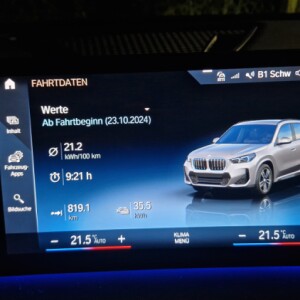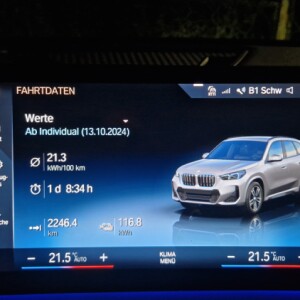Long day
As some may know, I've had a fully electric car since June 2023, and for me one of the great experiences of my 70 years. I'm not an Eco-Terrorist, although the idea of doing something,, if only a miniscule amount, to help try and improve the planet, did play a major role. And I had the privileged position of having the cash to buy one, thanks to my 1976-1990 company-forced private pension scheme.
I wouldn't preach EVs to anyone, and I understand the concerns, never mind the, so far, inability of the manufacturers to make sensible small to mid cars at an affordable price - für das Volk, as was the case in 1950s with the Beetle & Co.
However, I think it can be useful to document some of my own experiences on longer road trips - daily usage within a 100km radius with journeys up to 300km, are simply boring as they require no effort & cost next to nothing, charging from wallbox at home, at best using 'free' PV electricity.
My car, BMW iX1 30, 4WD, 494Nm, 0-100kmh 5.4 seconds, is not built on a dedicated EV-only chassis but is identical to the petrol & diesel versions. A bit of a brick compared to many of the sleek EVs, air slipstream being #1 criteria for consumption, even above weight. The iX1 has a comparatively small 65kWh battery & middle class charging rate of max 135kWh. Apart from being an absolute dream to drive, it does none of the things many believe to be crucial for EVs, very well.
Judge for yourselves, how you would take to today's trip from Hoek of Holland to home near Memmingen in Bavaria = 819km. I have a very good bladder kilometre-range of at least 500km, but my old bones certainly feel the strains of sitting for much more than 2 hrs & need a bit of exercise. I can't compete with Germany's 'Diesel Dieter' who can drive 1000km non-stop on one tank filling & that 7 days a week, preferably towing a 2 ton caravan.
EVs are far more sensitive to many factors than combustion engined cars (ICE) - not just driving style (I'm foot-to-the-floor where legally allowed & my car is limited to 185kmh (115mph), but wind, rain, load, seat & steering wheel heating etc, have a significant impact on consumption. This is because EVs are so much more efficient than ICEs. Of 1kW of EV energy, 80-90% is used to propel the vehicle while in an ICE, only about 35% of 1 litre of fuel is used, the rest wasted in excess heat & exhaust.
The next critical thing for most EV drivers are the kWh cost to charge at high speed DC (HPC) chargers - up to 350kWh - along your route. At home one uses 'slow' AC home electricity generally in UK up to 7kWh, in Germany 11kWh & my car can do 22kWh. I had booked a one month subscription with Ionity a pan-European charging company, costing €7.99, which reduces kWh charge from €0.69 to €0.39. So my aim was to charge at Ionity where ever possible, even if it meant some inconvenience. I was only occupant but back seats & boot were full - mainly with Tesco's groceries, and I had a large fridge box running all the time, also a drain on consumption. Journey or better said, charging planning would have worked out much better with a copilot.
Here are my stats for the journey but I'll start on late afternoon of the day before when I charged at Ionity Norwich to 97% battery State of Charge (SOC).
Drove 120km (75m) to Harwich & next day 66km (41m) from Hoek ferry terminal to 1st Ionity charge south of Rotterdam, averaging 16.4kWh/100km (3.33 miles/kWh). €11.29 for 186km (116m)
Charging from 48% to 88% took 26 minutes, longer than normal as the battery was cold (5⁰C at Hoek - ideal over 25⁰C) but I wasn't in a hurry as hadn't had breakfast on the ferry & was desperate for coffee.
Next planned stop seemingly out of reach but probably with a copilot I could have made it & BMW software, rather too cleverly, confused me a bit & led to some unnecessary mileage. After 250km & 3hrs 15 mins, arrived with 8% SOC at next best non-Ionity charger which took me up to 67% in 20 minutes, allowed a McD's coffee & enough to get to next Ionity. Cost €19.73, would have been €13.04 if Ionity.
Right, now to nearest Ionity to get a full charge which will make sure I get to over-next Ionity. A lot of traffic, both HGVs & cars, possibly half-term holidays. 145km in 1hr 37mins, arriving with 18% & charging to 86% in 30 minutes, this time having a McD's lunch & another coffee. 22kWh/100km (2.84m/kW) Cost €17.08.
Next session a traffic jam nightmare. I could have taken 2 routes, both of which were showing major hold ups. No idea if I choose the right one, but certainly didn't feel like it. 3hrs 1 minute for 168km, arriving with 19%SOC. And now the most annoying thing EV drivers suffer. The Ionity chargers were all cordoned off, out of operation, I think for replacement. Had I punched a few more buttons I would have seen that on the display. Luckily there were other chargers, so bit the bullet & paid extra cost €21.34 instead of €14.12. Got another coffee while car charged to 77% in 20 minutes, much too slow & annoyingly, as I was about to find out, I broke off charging just 3% less than was enough to get home. 25.6kWh/100km (2.4m/kW!)
Thought it would be home stretch now, but 20km away, the car went into 'tortoise' mode with only 2% left in battery. Car reduces performance considerably & a warning symbol in the former of a yellow tortoise appears on the screen. I wasn't going to take a chance. So final Ionity charge at Memmingen after exactly 2 hours & 190km. Just charged to 33% in 10 minutes, cost €8.34.
In total, Norwich to home 939km (587m) Cost €77.78 - would have been €63.87 if I had managed all stops at Ionity. Averaged 21.2kWh/100km (2.93miles/kWh) With sensible driving at around 120-130kmh & using Economy Mode (which reduces immediate performance which is still there if needed), I could have reduced charging to four stops & possibly three.
Yes, EV charging is stressful but primarily caused by the insane & unjustified pricing. There are, in general, enough chargers, EV cars software is more than capable of telling you when & where to charge, but if one is trying to contain costs & literally navigate around the mafia like jungle of tariffs for adhoc long distance fast chargers, it becomes a challenge. EV charging must be on a par with petrol stations - yes a penny or two +/- for different brands but not the extortionate prices most companies illicit. In the UK, EV owners with a home charger pay £0.07p or £0.08p/kWh while likes of BP, Shell & Co charge £0.79kWh. In Germany, can't get home charging from grid for under about €0.20, although PV charging is more common & thus either 'free' or as I calculate for me €0.12 as that is what I would be credited if the PV had been fed into the grid rather than car.
However, regardless of cost, there is a reduced environmental impact, but for me, major plus is the driving experience which totally out performs ICE cars. A real joy, safer & far more relaxed. But we all have different needs & preferences, so each to her's/his own, however nobody should fear EV travel.



Comments New comments are not currently accepted on this journal.